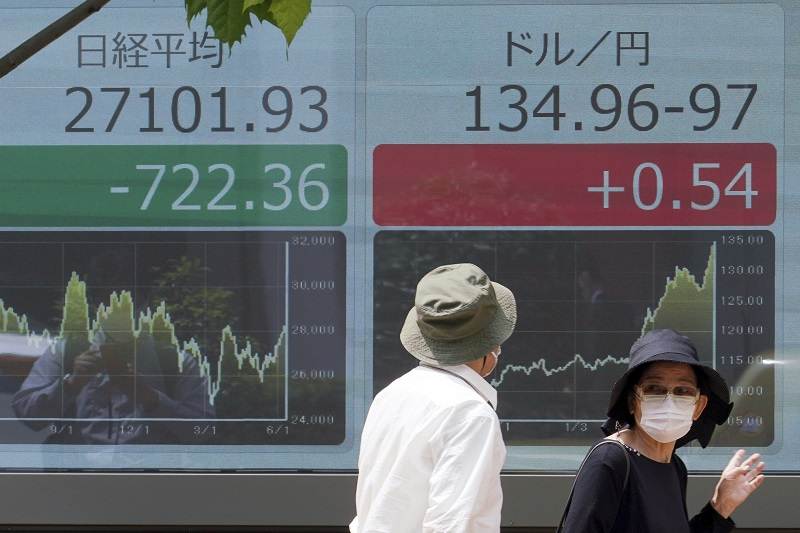
A woman and a man wearing masks walk in front of an electronic stock board showing Japan’s Nikkei 225 index and U.S. dollar/Japanese yen exchange rate at a securities firm on Monday in Tokyo.
13:42 JST, June 13, 2022
The effects of the yen’s depreciation this year have gone way beyond foreign exchange markets. The rapidly weakening yen has put greater burden on corporations and household budgets, but there are no special remedies on the horizon to stabilize market prices.
While the central banks of other countries have implemented tight monetary policies to deal with sharp inflation, the Bank of Japan maintains its monetary easing measures. As a result, low interest rates continue, and the yen, which has lost its attractiveness in term of fund management, has been sold.
The yen temporarily slumped to ¥135 against the dollar on Monday, marking its lowest level in the 20 years and four months since February 2002.
The yen’s depreciation has accelerated since the U.S. Federal Reserve dropped its zero-interest-rate policy and raised the rates in March.
Approaching negative aspects
The rapid depreciation of the yen has had a significant impact on Japanese companies. Major automakers, for example, factored in a range of ¥115 to ¥123 for the business year ending March 2023, far from the current level.
The yen’s depreciation will balloon the overseas earnings of Japanese automakers in yen terms. For example, Toyota Motor Corp.’s operating profit for its core business will normally increase by about ¥45 billion for every ¥1 of depreciation.
Some of these gains, however, will be offset by higher prices for raw materials that must be imported, such as steel and aluminum. “Negative aspects of the recent depreciation of the yen have been expanding partly due to soaring raw material prices,” said Seiichi Nagatsuka, a vice chairman of the Japan Automobile Manufacturers Association.
The combination of inflated material costs and a weakened yen could lead to serious damage for domestic demand-oriented companies.
Nitori Holdings Co., which makes and sells furniture produced in Asia, stands to lose about ¥2 billion in earnings in a year with every ¥1 of depreciation. There is a possibility that the company could experience business damage starting in October, when its current exchange contracts expire, or later.
Meiji Co., a major food maker, relies on imports for many of its raw materials, including cacao. A senior company executive complained, saying, “The current accelerating depreciation of the yen is a serious blow.”
Soaring raw material and energy prices have increased prices of cooking oil and familiar foods such as instant noodles. Manufacturers are trying to curb production costs, but cannot deal with the current situation with their own corporate efforts alone.
Japan relies on imports for many of its food ingredients. If the weakening of the yen progresses at this rate, there is concern that price hikes will spread further, putting greater burdens on household budgets.
Turnover possible?
In the past weeks, the yen also fell against the euro, the Australian dollar and the South Korean won.
This is because the European Central Bank and the central banks of Britain, Australia and South Korea, have moved toward a tight monetary policy one after another, which has highlighted the difference between them and the Bank of Japan, which maintains its low-interest policy.
However, many observers say that currency market intervention, which has a direct impact on trading prices, would be difficult.
In 1998, the government and the Bank of Japan intervened in the foreign exchange market by buying yen and selling dollars when the yen slumped to ¥135 against the dollar. However, these efforts to pop up the value of the yen had a limited effect.
In the market, there is concern about the depreciation of the yen further advancing.
Masafumi Yamamoto, chief currency strategist at Mizuho Securities Co. said, “If the rapid inflation is prolonged in the United States, we could see the yen reaching ¥140.”
Top Articles in Business
-

Prudential Life Insurance Plans to Fully Compensate for Damages Caused by Fraudulent Actions Without Waiting for Third-Party Committee Review
-

Narita Airport, Startup in Japan Demonstrate Machine to Compress Clothes for Tourists to Prevent People from Abandoning Suitcases
-

JR Tokai, Shizuoka Pref. Agree on Water Resources for Maglev Train Construction
-

KDDI Opens AI Data Center at Former Sharp Plant in Osaka Prefecture; Facility Will Provide Google’s Gemini AI Model for Domestic Users
-

Toyota Motor Group Firm to Sell Clean Energy Greenhouses for Strawberries
JN ACCESS RANKING
-

Japan Institute to Use Domestic Commercial Optical Lattice Clock to Set Japan Standard Time
-

Israeli Ambassador to Japan Speaks about Japan’s Role in the Reconstruction of Gaza
-

Man Infected with Measles May Have Come in Contact with Many People in Tokyo, Went to Store, Restaurant Around When Symptoms Emerged
-

Prudential Life Insurance Plans to Fully Compensate for Damages Caused by Fraudulent Actions Without Waiting for Third-Party Committee Review
-

Woman with Measles Visited Hospital in Tokyo Multiple Times Before Being Diagnosed with Disease



























